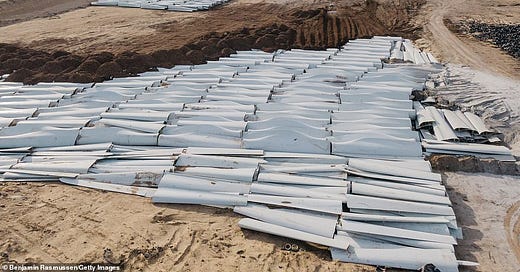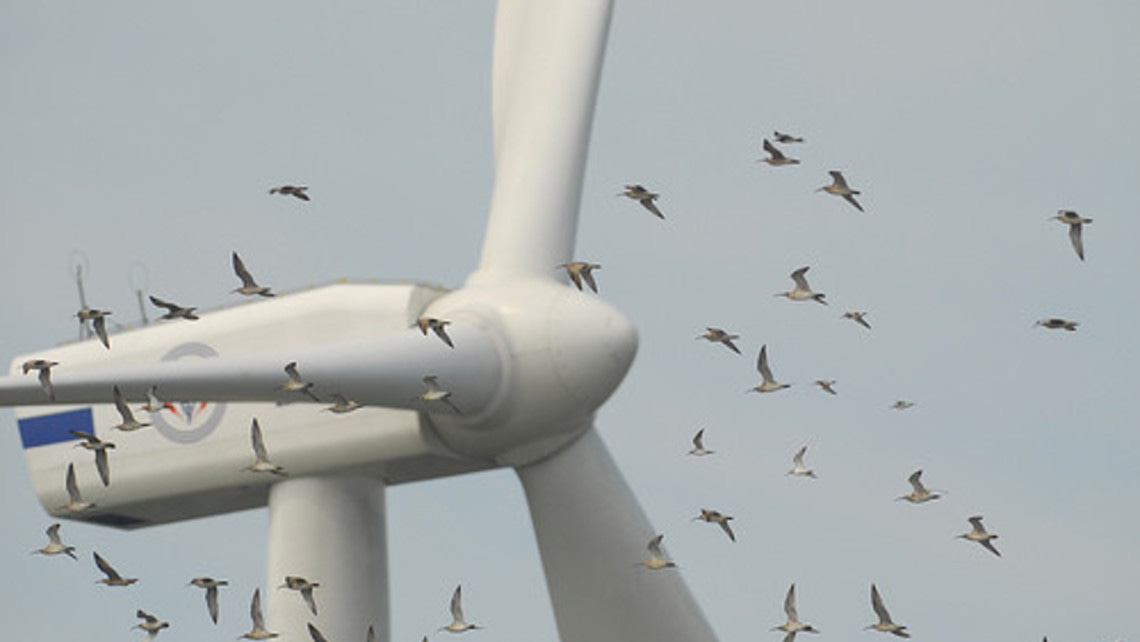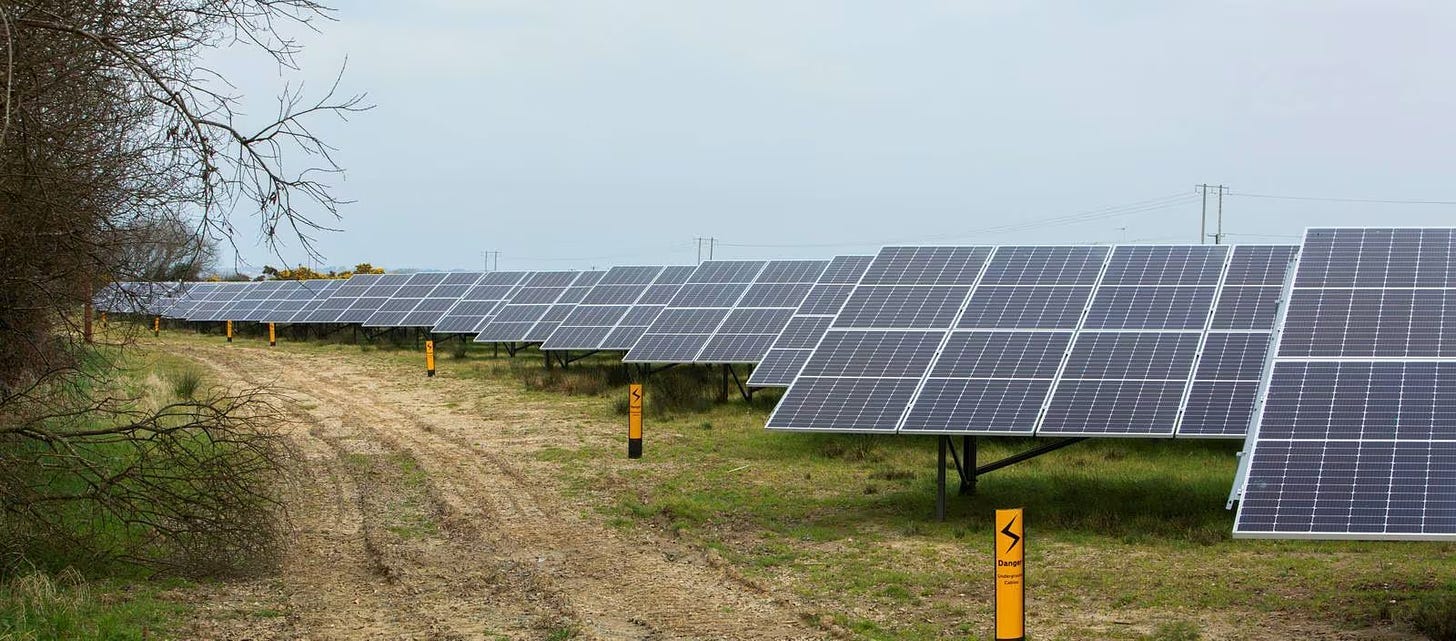Renewable energy is Ireland's next wave of colonial violence
Environmental destruction and colonial violence now come cloaked in false 'green' promises. Wind turbines and solar panels are not intergenerational thinking.
“Relationships do not merely shape reality, they are reality.”
— Shawn Wilson, Research Is Ceremony: Indigenous Research Methods
I’m writing this post off the back of the Irish state’s plans to develop a significant wind turbine power station (or ‘wind farm’) off the majority of the southern and south-eastern coasts of Ireland. I’ve personally found the news of this plan to be devastating. The destruction and violence necessary to maintain and historically produce modern societies can sometimes feel un-real until a new wave is on your doorstep threatening the little that remains. The development of this wind power station is just a continuation of our violent and dysfunctional relationships with the rest of life on Earth, which are generating climate collapse in the first place.
A huge tract of the Irish coast is about to be heavily industrialised and hardly anyone seems to care much beyond some weak NIMBY (not in my back yard) concerns. Even at that there isn’t enough NIMBYism to stop it from happening — it’s apparent most people have been hoodwinked by the propaganda of ‘renewables’ years ahead of time. If there are descendants to remember our generations, we might be lucky to get a charitable “they didn’t know any better in those times”. Other waves of industrialisation historically saw opposition and it’s all too easy for these efforts to be invisibilised. One example being that we thankfully do not have nuclear power plants in Ireland due to the efforts of anti-nuclear mobilisations in the late 1970s (Leonard, 2007) when several nuclear plants were planned by the Irish state and the ‘Nuclear Energy Board’ had been established. It is perfectly possible to stop these things from going ahead if the will is there.
So-called ‘renewables’ are not sustainable
It is not news that high-tech solutions being heralded as ‘green’ solutions to our harrowing global predicaments are in fact false promises which in practice require the continued escalation of environmental destruction and colonial violence. In economic terms, the only ‘winners’ from these energy infrastructure projects are the investors of large multinational corporations. Working class people are once again the losers as the state will pay out huge sums from public coffers to foot the bill for these projects, while the privatised energy supply will continue to be sold to us at ever-increasing ‘competitive rates’.
Wind turbines have a lifespan of about 20 years. Solar panels aren’t much better at about 25 to 30 years. Most blades (the moving part of the wind turbine) will end up in landfills like in the image at the top, because they’re made of plastics like fiberglass that aren’t ‘cost-efficient’ to recycle. This ‘renewable’ energy source requires a constant supply of plastics to be constructed and frequently replaced, ie. it requires oil production. Solar panels also mostly end up in landfills when they can no longer be used, because again dumping them is cheaper than any other alternative. Both wind turbines and solar panels rely on lithium-ion batteries, which, if you’ve ever owned a mobile phone or other battery-powered consumer tech, you’ll know that they tend to deteriorate pretty quickly: in about three to five years. Amidst information surrounding the ongoing genocide in Palestine you may have also come across people on social media trying to draw attention to other genocides currently taking place. One such instance is in the Congo, which has seen ongoing conflict and war for many generations since colonisation began. According to Siddharth Kara’s recent bestseller Cobalt Red: How the Blood of the Congo Powers Our Lives, over 70% of global capitalism’s supply of cobalt comes from the Congo, which is an essential component of batteries used in household consumer tech, electric cars, and ‘renewables’. Approximately 7 million people — about the same as the entire population of Ireland — in the Congo have been violently displaced, with much of it attributed to the expansion of cobalt and copper mining projects.
Consider the immense quantities of steel, silicon, iron, lithium, graphite, cobalt, copper, and aluminium that wind and solar infrastructure require. Land has to be destroyed to extract them. People have to be displaced and killed for access to new sources of materials to meet ever-growing demand. People have to do the labour in horrific conditions that nobody in Ireland would accept if it were them. Hypothetically replacing oil and gas with wind and solar infrastructure just shifts the locus of our dependencies, but we’d still be over-dependent on environmental catastrophe and colonial violence to support the crushing weight of continuing to live modern lifeways. If turbines and panels have to be replaced so frequently then by design the infrastructure necessitates an unceasing and likely ever-increasing volume of the materials used to manufacture them as all of our landscapes become increasingly covered in them. This is an example of the destruction and violence structurally necessary to maintain the living of modern lifeways.
Aramid, a plastic used in some turbine construction, was found to have a similar effect to asbestos when inhaled, ie. it’s highly carcinogenic. I wonder what the long-term effects are of these materials slowly decaying over eons into soil and groundwater, the very bases from which much of life is sustained? Hundreds of thousands of bats are killed every year by moving turbine blades in the US alone. Birds don’t fare much better. Globally, nearly half of all bird species are in decline and in Ireland that figure is about 63%. And that is without significant wind infrastructure yet. How do we imagine this ends if we continue to fill the sky with turbines? These are only some of the many issues surrounding the development of such infrastructure, just to give a sense of their invisibilised costs.
If you’re wondering if this is just an attack on ‘renewables’ and therefore I must be in favour of maintaining the status quo: no, I am not in favour of the continued industrial production of oil and gas. The reality is far more complicated than mainstream discussions about this would have us believe. Industrial production of just about anything at this juncture isn’t a good idea (and never was) but given our over-dependence on the industrial production of everything we require to survive and sustain modern lifeways, it could not be ceased overnight without causing untold suffering. The paradoxical reality is that at this juncture we still need oil to be drilled unless we want to see an extremely severe global famine which would likely result in the deaths of billions of people. It’s a double bind that doesn’t get talked about because it doesn’t sound very sexy or promising. But that’s one of the most major paradoxes of our times. Oil production can’t be stopped and yet needed to be stopped yesterday. This is a paradoxical predicament that requires working through on many levels and in many different ways – there’s certainly no easy solution.
Neither do ‘renewables’ represent some kind of an independence movement away from the tyranny of over-dependence on oil infrastructure. A dominant idea is that they are somehow a ‘transition’ away from oil and gas, but no such transition is being implemented in practice by those planning and constructing them. Any talk of a ‘transition’ boils down to mere propaganda and obfuscation. It’s full steam ahead with oil production, with ‘peak oil’ forecasts still being pushed out further all the time and likely to be nowhere in sight. ‘Renewables’ just represent an opening of even more exploitable frontiers for global capital to further ravage the planet and make enormous profits from doing so.
Neither is there a ‘lesser evil’ between oil and gas on the one hand and ‘renewables’ on the other. Again, they can’t even really be thought of as being on ‘different hands’ given that ‘renewables’ require oil and oil-based infrastructure to be produced and maintained. Clutching for a ‘lesser evil’ logic to our predicaments is an exercise in avoidance of the unavoidable: modernised societies have an inherently imbalanced and violent relationship with the rest of life on Earth, and that is something that needs to be fundamentally altered at its core. The relational problems we face are cultural and spiritual in character, not technological. It’s an understandable impulse to want to clutch for ‘lesser evil’ thinking because we want to believe there’s a solution, and we want to believe it’s relatively straightforward. We’ve been culturally conditioned into this solutionist paradigm. There’s an emotional appeal in it because the alternative is a vast field of unknowns and unknowability for which we have few individual or collective capacities to deal with. A recurring theme in traditional stories in Ireland involving the Other Crowd (fairies) is the ‘fairy field’, where once a person enters it, the way they came in seems to vanish behind them and as they walk around in circles they find there is no other obvious way out. Maybe that field is somewhere we need to go to experience meascán mearaí (confused bewilderment) before we can hope to begin finding our way home again.
The destructive impacts of wind and solar infrastructure development stand to be even more severe now particularly when so much destruction has already been wrought by other waves of industrialisation and modernisation over the past few centuries. In other words, with ‘whats left’ turbines serve to have a greater devastating impact than if they were being developed in a hypothetical pre-oil era — which is an impossibility anyway as they require oil. Not simply because they use petroleum byproducts in their construction and rely on oil-powered infrastructure to be built and maintained, but because if a select few countries in the Global North steer towards replacing their domestic energy consumption with ‘renewable’ energy in coming years, they are still going to be relying on Global South countries for food, materials, and resources that require oil production to continue. The situation is all too predictable, and already underway: being ‘green’ will become the new ‘civilised’, the new ‘developed’. Just like being ‘developed’, being ‘green’ within the modern/colonial world-system is contingent on continued extraction and violence – ie. it’s not ‘green’ at all. Global North actors will and already are beginning to chastise those in the Global South for carbon emissions and such. Which is completely absurd given that, for example, the entire continent of Africa emits just 3.9% of total global CO2 emissions despite having nearly 18% of the world’s population. Not only this, but as I am pointing out: without oil-powered activities in the Global South, the Global North would simply not be able to maintain modern lifeways at all.
Fossil fuels are not inherently bad — they aren’t even the problem
Is there even an argument to be made in favour of some fossil fuels? That’s more complicated, because on a small, non-industrial scale their usage isn’t inherently bad. I think we are broadly familiar with this discussion in Ireland due to recent bans on commercial turf sales. People have been lighting small turf fires in Ireland for centuries if not millennia. This practice is not and would never lead to a planetary climate cataclysm of the kind brought about by industrial civilisation, but it makes for an easy political target. Representatives of the interests of capital seek to obfuscate discourse on these matters by honing in on turf burning or wood stoves in sub-Saharan Africa in order to draw attention and action away from the most major offenders. It is typical of the kinds of narrow, reductive, and binary ways of thinking we’re conditioned into in modern society that label all things categorised as fossil fuels as inherently ‘bad’ or even ‘evil’, and makes it all too easy for vested power interests to generate propaganda to pull attention away from where the most significant damage is happening.
Things like fossil fuels also effectively become scapegoats for us to project all of our difficult feelings, fears, and anxieties relating to our predicaments onto instead of doing much more difficult kinds of work. The burning of fossil fuels is of course the most integral technology underpinning contemporary modernity, but it is not the issue underpinning our predicaments. Again, those issues are primarily relational. Scapegoats like fossil fuels also keep us stuck in the same old modalities of political and social possibility, because they are easily quantified and commodified, such as with things like ‘carbon offsets’ or ‘carbon trading’ which simply manipulate a few numbers on a computer and get passed off as solutions. Our predicaments can’t be ‘hacked’.
Our predicaments, solutionism, and the discourse of intergenerational thinking
So-called ‘renewable energy’ is often promised as future-oriented action, or a practical solution to climate collapse. Implicit in mainstream discourses on the matter is that ‘renewables’ are a way to ensure that future generations will be able to continue living modern lifeways — not any other kind of way — and thus they represent intergenerational thinking. Presupposing that future generations should and can continue living modern lifeways is already not thinking intergenerationally because (a) modern lifeways are structurally dependent on the short-term frenzy of unbridled extraction and violence that has defined emergent colonial systems since 1492 and which are generating a planetary cataclysm, and (b) we cannot dictate or predict the shape and character of emergent social/cultural change that this planetary cataclysm will precipitate. If anything is certain within the coming centuries, if not merely decades, it’s that modern lifeways will become structurally untenable under the weight of the planet’s rejection of our hyper-exploitative relationship to the rest of life on Earth. At a point there will be no choice but to live in other ways.
Living in any other way is generally inconceivable to the culturally modernised mind that understands modernity to be the apex of human history and cultural possibility. At even a basic level the viability of continuing to live modern lifeways is rarely (if ever) questioned or challenged. It’s just taken for granted that the way in which we live now is inherently and self-evidently ‘better’ than anything that preceded it or that exists on its margins and thus it doesn’t get called into question. In fact, our modern lifeways are fundamentally unsustainable because of the extractive and violent relationships with the rest of life they are premised on. No amount of plastering the land with wind turbines and solar panels is going to change that – it just deepens our predicament. Which feels bizarre to have to even argue: more industrialisation of nature and more colonial violence will make things worse. These false solutions are just another intensification of the violence necessary for us to maintain the unmaintainable, and continue to live in culturally-sanctioned denial that we have any relational responsibilities at all toward the rest of life, which require of us a society-wide ethics of care, nurturance, and respect that we currently do not have.
‘Renewables’ are further driving us into the ever-growing oblivion of collapse because they are paradigmatically situated in relationship denial and as such require even more violence against the land, human people, and non-human beings. On the one hand they are not even what they purport to be: they are not ‘renewable’ nor ‘sustainable’. On the other hand, the false ‘green’ promises they come cloaked in encourage us to be content with simplistic solutions to unfathomably complex and far-reaching predicaments. Some distinction is necessary here: problems differ from predicaments, and solutions differ from responses. Predicaments are usually much more complex situations with no clear way out. Responses are a much broader array of capacities than just problem-solving. Problem-solving is a type of response, and one which is not appropriate for every scenario. The problem/solution binary is central to the functioning of modernity, and as culturally modernised people we generally imagine most difficulties to be ‘problems’ that can be solved in a rational way with a bit of ingenuity, the right technology, and some elbow grease. Solutions are almost seen as an inevitability within this paradigm: it’s only a matter of time before there’s a solution for any and every problem. But even in our own personal lives, how many of our difficulties and heartbreaks are ever simple ‘problems’ with straightforward solutions? They are often processes and predicaments that need to be lived through and responded to with wisdom and care. For example, I have lived with depression for most of my life which at times can be utterly crippling. The way I’ve come to see it is that depression is a sign that my body is working. It is a very normal response to the soul-crushing conditions of the timespace we currently inhabit. I don’t anticipate that my capacity to be depressed will be something that will ever fully leave the experiential basis of my life, nor do I need it to. It is not a problem to be solved, but rather a process that requires me to honour it and listen to what it is telling me or asking of me. In modern society however, depression is cast as a problem, and its solution is anything from medication to getting up at 5am and washing your dishes with great intention. These things might help us cope, and they might be life-saving, but they won’t solve anything and they don’t address the root causes.
Neither is it that problems are out there just waiting for humans to solve them. Problems are something we culturally generate and manufacture in many different ways. It is actually this ‘problem-making’ compulsion integral to modern/colonial culture that is in part responsible for generating the predicaments we now find ourselves mired in. We recast the land, and ourselves, as problems to be solved. We imagine that more of the same can somehow fix things. Climate collapse is generally conceived of in this grossly over-simplistic and infantile way within mainstream discourses: as a remote problem with remote solutions. Solutionist responses can and should be component parts of the ways in which we collectively respond to the unfolding of this process, but those solutions should probably be based on relational repair with nature, not effectively putting an inherently violent civilisational paradigm that is dying on life-support.
It’s important to consider what ways we can even begin responding to our predicaments when so many of our capacities for collective response have been historically eroded. Surely if it is these capacities which enable us to adequately respond to crises in the first place, it’s these capacities we need to set about repairing and remembering in order to build collective response-ability again. A response-able culture would never have let things get this out of hand in the first place, and it certainly wouldn’t allow even more irresponsibility to pass as an acceptable response.
That’s the most ‘hopeful’ ending I can give this essay because this huge wave of industrial destruction is imminent and it doesn’t look like opposition is likely. Maybe we’ll be able to stop the next one.
Sources:
Leonard, L. (2007) The Environmental Movement in Ireland. Berlin: Springer Science and Business Media.








Excellent post.
Thanks for raising awareness about this.
I am attempting to do the same here in Canada regarding the push for aggressive lithium mining in the boreal forest.
https://gavinmounsey.substack.com/p/an-introduction-to-a-new-series-befriending